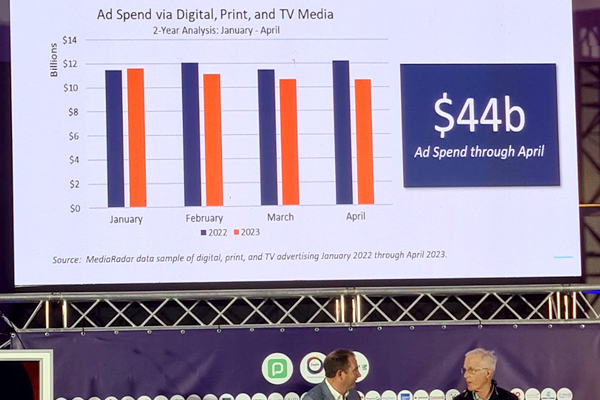
The 45th FIPP World Media Congress recently concluded in Portugal, attracting media professionals and industry leaders from around the world. The event served as a platform for insightful discussions, innovative ideas, and collaboration. Prominent speakers and industry leaders offered valuable insights about technology, AI, community engagement, data utilization, and creativity.
Over the course of the event, industry leaders emphasized the significance of digital transformation, audience engagement, and sustainable practices that are shaping the future of the media landscape.
The Congress highlighted the importance of leveraging emerging technologies to enhance content delivery and engage audiences in new and exciting ways. Also, emphasized the rapidly evolving media landscape presenting both challenges and opportunities.
Top five talking points from the Congress
Technology: Rethinking the Future of Media
Technology continues to be a major focal point in reshaping the future of media.
"We need to leverage technology to adapt and thrive in a rapidly evolving media landscape," said Tav Klitgaard, speaker at the Congress and CEO of Zetland, an innovative online magazine based in Copenhagen.
"The key lies in understanding how technology can enhance content delivery, engage audiences, and drive innovation," mentioned Steffen Damborg, author of the book Mastering Digital Transformation and speaker at the Congress.
Participants discussed the impact of technology on content creation, distribution, and consumption. They explored emerging trends such as immersive experiences, virtual reality, and augmented reality, underscoring the importance of embracing technological advancements to stay ahead in a competitive digital environment.
Artificial Intelligence: Opportunity or Threat?
Artificial Intelligence (AI) emerged as a topic of great interest and debate. Speakers examined the opportunities and challenges that AI presents for the media industry. While some voiced concerns about the potential impact on jobs and content quality, others highlighted the immense possibilities AI offers for audience targeting, personalization, and automation.
During the Congress, panel discussions addressed the ethical implications of AI, emphasizing the need for responsible implementation and ensuring transparency. Industry leaders stressed the importance of human oversight and collaboration between technology and creative teams to leverage AI effectively.
Effective Engagement: Unlocking Value for Readers
In an era of digital abundance, effective audience engagement has become vital for media organizations. The Congress emphasized the need to build strong connections with readers through tailored content and interactive experiences.
"Engagement remains critical in the digital landscape,” said Damborg. “It is about capturing and retaining the attention of readers, fostering a sense of community, and providing value."
Industry leaders shared strategies to enhance engagement, including exploring social media platforms, facilitating direct interactions with audiences, and cultivating user- generated content.
The Congress showcased successful case studies where media organizations effectively engaged readers through creative storytelling, resulting in increased loyalty and monetization opportunities.
Utilizing Data: Unlocking Opportunities for Publishers
Data utilization was a key focus at the Congress, with speakers highlighting its pivotal role in shaping content strategies and driving business growth. Dan Pacheco, Horvitz Chair in Journalism Innovation at the S.I. Newhouse School, Syracuse University, delivered an insightful presentation, stating, "Data is the key to understanding audience preferences, identifying trends, and making informed decisions."
Participants discussed the importance of leveraging data to create personalized experiences, deliver targeted advertising, and optimize content distribution. The Congress emphasized the need for media organizations to invest in data analytic capabilities and cultivate a data-driven culture to unlock new opportunities for audience engagement and revenue generation.
Creativity: Transforming Presentations to Attract Advertisers
Creativity emerged as a crucial factor in capturing the attention of advertisers and driving revenue growth. Jacqueline Loch, EVP of Social & Emerging Platforms of SJC Media based in Toronto, shared valuable insights on transforming presentations to attract potential advertisers.
"Creativity is key to standing out in a crowded advertising landscape,” said Loch. “Media organizations need to create compelling narratives, demonstrate innovative solutions, and showcase the value they can offer to advertisers."
The Congress showcased innovative approaches to advertising, including native advertising, branded content, and influencer partnerships. Industry leaders emphasized the importance of collaboration between content creators, marketers, and advertisers to develop impactful campaigns that resonate with audiences and drive results.
The event also featured engaging sessions on developing revenue streams and long-term growth strategies. Industry leaders shared their experiences and best practices, encouraging collaboration and knowledge-sharing among attendees.
In conclusion, the 45th FIPP World Media Congress served as a dynamic platform for media professionals to explore the future of the industry. The discussions on technology, AI, engagement, data utilization, and creativity shed light on the transformative potential of these areas.
As the media landscape continues to evolve, events like these foster innovation, collaboration, and forward-thinking strategies.